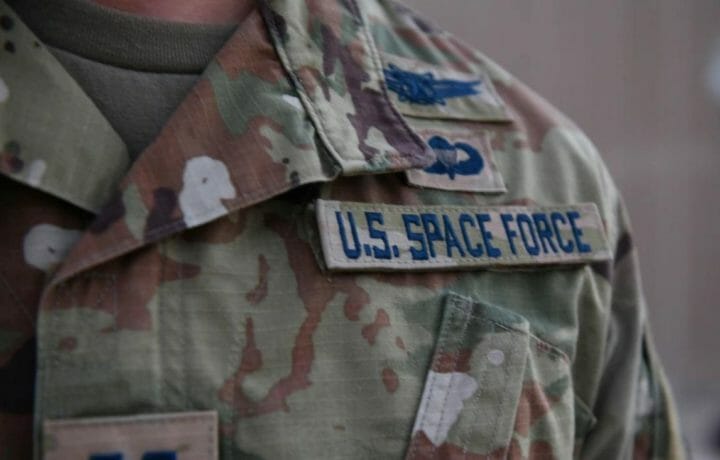The Netflix original series Space Force has been canceled after two-seasons, and reportedly members of the United States Space Force actually aren’t all that disappointed to see the series not-so-boldly go away. The streaming service series, which was created by Greg Daniels and Steve Carell (who also starred), had debuted to mixed reviews in May 2020, just five months after then President Donald Trump officially established the sixth and newest branch of the United States military.
The Space Force became the first new independent military service to be created since the Army Air Force was reorganized as the United States Air Force in 1947.
Space Force, the TV series, is essentially a workplace comedy that centers on a group of individuals tasked with establishing the new service. What is noteworthy is that its approval rating actually improved significantly with its second season, but apparently not enough to warrant a third season.
Guardians Not Upset
Though some fans of the show may be sorry to see it come to an end, for actual service members of the Space Force there has been little love for the satire. Steve Carell, best known for playing a rather inept boss on NBC’s The Office, was hardly seen as an ideal depiction of the leader of the newest and smallest branch of the U.S. military.
Since it was established, the unit has been in the spotlight for everything from its uniforms to its logo, which some unfavorably and even erroneously suggested was stolen from TV’s Star Trek. The name of the service members – Guardians – has also attracted scrutiny for being akin to the Marvel comic book franchise Guardians of the Galaxy.
According to a report from Miltiary.com, many Space Force Guardians have found that the series made it hard to teach and educate the general public of the importance of their mission, which includes protecting the U.S. satellite fleet, and maintaining control of the space domain.
Failure to Launch
The show had garnered significant buzz when it was announced, as it had a star-studded cast that included Carell, John Malkovich, Ben Schwartz and Lisa Kudrow. However, it was never a breakout hit on the streaming service, while the second season even failed to register on Netflix’s weekly Top 10 ranking, but did make a brief appearance on the streaming originals’ Nielsen charts.
The series did initially help bring awareness to the newest branch of the military, but the luster wore off quickly.
“The marketing value behind the ‘Space Force’ show was phenomenal, in that it highlighted that there is actually a new service out there,” Col. Bill Woolf, United States Air Force (Retired), president and founder of the nonprofit Space Force Association, told Military.com. “Unfortunately, it did not capture the culture accurately at all. In fact, it probably diluted the ability for Americans to actually see the importance of the space superiority mission that the Space Force trains toward.”
The fact that members of the actual Space Force weren’t fans of the series likely had little to do with its cancelation.
“It was more of a creative decision,” explained Jason Chung, B.C.L., LL.B., assistant professor at Pompea College of Business at the University of New Haven.
“There has been a trend with Netflix of canceling series early, so it wasn’t swayed by the military, and it was a questionable decision, given that the show was gaining an audience,” Chung told ClearanceJobs.
“It could also be a sign of the times, as audiences are a bit more polarized,” suggested Claudia Myers, associate professor in the School of Communication at the American University. “People may be gravitating to a different type of comedy.”
History of the Military and TV
Space Force is hardly the first series to put the U.S. military in a “questionable” light. From 1955 to 1959, The Phil Silvers Show focused on the exploits of the U.S. Army’s Master Sgt. Ernest G. Bilko, who spent most of his time trying to make money through various get-rich-quick schemes.
Seeing the success that CBS had with The Phil Silvers Show, just a few years later ABC attempted to create a similar series starring Ernest Borgnine as Quinton McHale, commanding officer of the U.S. Navy PT Boat PT-73. While the one-hour pilot, which debuted on Fred Astaire’s Premiere Theatre anthology series, was a lighthearted drama, the show was retooled as a half-hour comedy titled McHale’s Navy. The series ran from 1962 to 1966, during which time McHale was known to wear Hawaiian-style clothing and use his PT boat to go deep-sea fishing and water-skiing.
The 1960s saw other military themed comedies including Hogan’s Heroes and Gomer Pyle, U.S.M.C., but it was in the 1972 that the most famous of the military satires debuted. M*A*S*H , which was developed as a spin-off from the 1970 feature film of the same name and based on the book MASH: A Novel About Three Army Doctors, ran for 11 season and received critical acclaim.
Its series finale became the most-watched and highest-rated single television episode in U.S. television history, and had a record-breaking 125 million viewers. While it often took a dark comedy tone, it rarely presented a favorable view of the military.
Respecting Satire
Even if many of these comedies didn’t always paint the military in the best light, they shouldn’t be viewed as anti-military or anti-patriotic.
“These shows are satire, and it is often a form of respect, as it shows that Americans have an interest in the military,” suggested Chung. “Some of that is respectful and solemn and some is tongue and cheek. At the end of the day, it is a point of curiosity and love, rather than disrespect. That is what satire is meant to do.”



